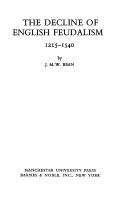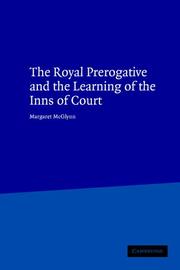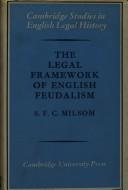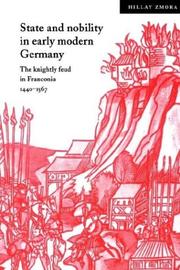| Listing 1 - 9 of 9 |
Sort by
|
Book
Year: 1957 Publisher: Cambridge, Mass. : Harvard University Press,
Abstract | Keywords | Export | Availability | Bookmark
 Loading...
Loading...Choose an application
- Reference Manager
- EndNote
- RefWorks (Direct export to RefWorks)
Feudalism --- Feudal law --- Féodalité --- Droit féodal
Book
ISBN: 9004529179 9004504540 Year: 2023 Publisher: Boston : BRILL,
Abstract | Keywords | Export | Availability | Bookmark
 Loading...
Loading...Choose an application
- Reference Manager
- EndNote
- RefWorks (Direct export to RefWorks)
This book offers an English translation, a working Latin text, and an up-do-date historical and historiographical overview of the Libri Feudorum, the earliest known collection of feudal law lying at the core of current debates on feudalism.
Feudal law --- Libri feudorum. --- Droit féodal --- Feudalism --- Law, Feudal --- Land tenure --- Law --- Law and legislation --- Feudorum consuetudines --- Consuetudines feudorum --- Decima collatio

ISBN: 071900294X Year: 1968 Publisher: Manchester : New York : Manchester U.P ; Barnes & Noble,
Abstract | Keywords | Export | Availability | Bookmark
 Loading...
Loading...Choose an application
- Reference Manager
- EndNote
- RefWorks (Direct export to RefWorks)
Feudal law --- Feudalism --- Féodalité --- -Feudalism --- -Law, Medieval --- Medieval law --- Feudal tenure --- Civilization, Medieval --- Land tenure --- Land use --- Land use, Rural --- Chivalry --- Estates (Social orders) --- Droit féodal --- Law, Feudal --- Law --- Law and legislation --- Law, Medieval. --- Féodalité --- Law, Medieval
Book
ISBN: 3428097564 9783428097562 Year: 2000 Volume: 21 Publisher: Berlin: Dunker und Humblot,
Abstract | Keywords | Export | Availability | Bookmark
 Loading...
Loading...Choose an application
- Reference Manager
- EndNote
- RefWorks (Direct export to RefWorks)
It is the aim of this collection of reports to establish a basis for comparing various seigneurial courts in pre-modern Europe. The contributors are largely medievalists. To come to terms with the subject, a defintion of courts which were seigneurial, given the variety of legal heritages, had to be set up. One of the first observations made was that on the Continent, where central courts were less prominent, there appears to be a more flexible notion of seigneurial jurisdiction. The contributors then look at the variety of jurisdictions in which lords in medieval and early modern Europe governed the legal relations of their vassals. Also the seigneurial jurisdiction is placed within its national context as one variety of courts which co-existed with other forums. Next the authors observe the origin and nature of substantive law which was implemented in the courts. Finally, focus is put on procedure. In England the medieval period witnessed considerable developments in the way in which cases came before the manorial court and how proof of the compainant's claim was ascertained. The reports provide a framework for further study. They demonstrate similarities and differences between seigneurial jurisdictions in England and on the Continent. One significant observation is that seigneurial jurisdictions seemed to have survived longer on the Continent than in England. Moreover, Continental seigneurial courts seemed to have serviced a broader strata of society. Yet, what is perhaps most striking are the similarities in procedure and in the process of custom making which the collected reports uncover.
Law, Medieval --- Feudal courts --- Manorial courts --- Feudal law --- Droit médiéval --- Cours féodales --- Tribunaux seigneuriaux --- Droit féodal --- -Jurisdiction --- -Manorial courts --- -Courts, Manorial --- Courts baron and courts leet --- Competent authority --- Law --- Conflict of judicial decisions --- Courts --- Judgments --- Venue --- History --- Jurisdiction --- History. --- -History --- Droit médiéval --- Cours féodales --- Droit féodal --- Courts, Manorial

ISBN: 0521804299 0521187699 1107131006 0511179987 0511063709 0511306865 0511495420 1280419075 0511203969 0511072163 9780511063701 9780511179983 9780511072161 9780511495427 9780521804295 9780521187695 Year: 2003 Publisher: Cambridge: Cambridge university press,
Abstract | Keywords | Export | Availability | Bookmark
 Loading...
Loading...Choose an application
- Reference Manager
- EndNote
- RefWorks (Direct export to RefWorks)
Between the mid-fifteenth and mid-sixteenth century Prerogativa Regis, a central text of fiscal feudalism, was introduced into the curriculum of the Inns of Court, developed, and then abandoned. This 2003 book argues that while lawyers often turned their attention to the text when political and financial issues brought it to the fore, they sought to maintain an intellectual consistency and coherence in the law. Discussions of both substance and procedure demonstrate how readers reflected the concerns of their time in the topics they chose to consider and how they drew on the learning of both their predecessors and their peers at the Inns. The first study based primarily on readings, this book threw light on legal education, early Tudor financial and administrative procedure, and the relationship between the ways that law was made, taught and used.
Prerogative, Royal --- Feudal law --- Inns of Court --- History --- Royal prerogative --- Court, Inns of --- Droit féodal --- Feudalism --- Law, Feudal --- Law --- Executive power --- Monarchy --- Divine right of kings --- Regalia --- Bar associations --- Land tenure --- Law and legislation --- General and Others --- Inns of Court. --- History. --- Inns of Court School of Law

ISBN: 0521209471 0521082838 1139085204 0511561245 9780521209472 9780511561245 9780521082839 Year: 1976 Publisher: Cambridge: Cambridge university press,
Abstract | Keywords | Export | Availability | Bookmark
 Loading...
Loading...Choose an application
- Reference Manager
- EndNote
- RefWorks (Direct export to RefWorks)
Professor Milsom works out a fresh view of the beginnings of the common law concerning land. The received picture depends upon progressive assumptions: key words began with their later meanings; the law began with abstract ideas of property; a tenant's title to his tenement was never subject to his lord's control; the lord had no discretion, only the power to decide disputes according to external criteria; jurisdiction in that sense was all the lord lost as royal remedies developed; and all the tenant gained was better protection of unaltered rights. It is a picture of procedural changes taking place against an unchanging background, with the feudal structure at the beginning almost as insubstantial as it was to be at the end.
History of the law --- Great Britain --- Feudal law --- Droit féodal --- Law, Feudal --- Land tenure --- 34 <09> --- 34 <09> Rechtsgeschiedenis --(algemeen) --- Rechtsgeschiedenis --(algemeen) --- Feudalism --- Law and legislation --- Law --- Arts and Humanities --- History --- Land tenure - Law and legislation - Great Britain --- Feudal law - Great Britain --- Real property
Book
ISBN: 9780812243680 0812243684 1322511918 0812208811 Year: 2012 Publisher: Philadelphia University of Pennsylvania Press
Abstract | Keywords | Export | Availability | Bookmark
 Loading...
Loading...Choose an application
- Reference Manager
- EndNote
- RefWorks (Direct export to RefWorks)
"In the mid-nineteenth century, Jacob Grimm published a collection of late medieval records of local law--called Weistümer--that was scarcely less comprehensive than his famous collection of fairy tales. As with the fairy tales, Grimm assumed that before their transcription, people had handed these down orally from time immemorial. His interest in these customary laws arose from their seemingly folkloristic notions of custom and from their poetic narratives about ritualized encounters between lords and peasants, capturing an oral tradition from an unsophisticated time. Grimm's readings are still used today as a basis for theories about oral societies in the premodern West and contemporary non-Western societies and the modernizing effects of writing. As Simon Teuscher contends, however, those aspects of legal texts that have been considered since Grimm to be vestiges of a traditional preliterate popular culture were eventually rooted in relatively advanced and learned techniques of ^writing, jurisprudence, and administration. Lords' Rights and Peasant Stories uses examples from German- and French-speaking Switzerland to investigate what legal order meant to individuals and to a society at the eve of the early modern period. Teuscher deals with legal documents not only as texts, but also as objects. The book takes the materiality of documents seriously and reconstructs cultural techniques of their production and social practices of their use. Lords' Rights and Peasant Stories suggests the need to rethink master narratives about transitions from oral to literate societies. It explores the local dimensions of processes of state-formation and the emergence of modern notions of law in western Europe. Students of rural society and village organization will find here a discussion of local power distribution that is inspired by social anthropology, that looks beyond simple antagonisms between lords and peasants, and that insists on the role of state servants and the unco nscious effects of their writing practices"--Provided by publisher.
Customary law --- Feudal law --- Law, Germanic --- Germanic law --- Droit féodal --- Feudalism --- Law, Feudal --- Land tenure --- Customs (Law) --- Folk law --- Usage and custom (Law) --- Social norms --- Common law --- Time immemorial (Law) --- History --- Law --- Law and legislation --- Law, Primitive --- Traditional law --- History. --- Medieval and Renaissance Studies.
Book
ISBN: 9004283269 9789004283268 9789004282896 9004282890 1322237204 Year: 2015 Publisher: Leiden, The Netherlands
Abstract | Keywords | Export | Availability | Bookmark
 Loading...
Loading...Choose an application
- Reference Manager
- EndNote
- RefWorks (Direct export to RefWorks)
In For the Common Good: The Bohemian Land Law and the Beginning of the Hussite Revolution Jeanne E. Grant presents an interpretation of the mentality of leading nobles within the Czech kingdom to understand their political actions in the Hussite Revolution. The nobles’ viewpoint derived from a confluence of legal, political, and religious ideas. Analyzing these ideas in the law book written by Ondřej z Dubé, manifestos, and political documents, Jeanne E. Grant shows that both Hussite and Catholic representatives of the kingdom who participated in the revolution adhered to consistent and widespread conceptions of their relationship to the kingdom, crown, and king that compelled them to defend the common good as they understood it.
Land tenure --- Land titles --- Feudal law --- Droit féodal --- Feudalism --- Law, Feudal --- Land-warrants --- Titles, Land --- Conveyancing --- Deeds --- Ejectment --- Prescription (Law) --- Vendors and purchasers --- Agrarian tenure --- Feudal tenure --- Freehold --- Land ownership --- Land question --- Landownership --- Tenure of land --- Land use, Rural --- Real property --- Land, Nationalization of --- Landowners --- Serfdom --- Law and legislation --- Law --- Ondřej, --- Bohemia (Czech Republic) --- History

ISBN: 0521561795 052152265X 0511583222 0511004192 9780511004193 Year: 1997 Publisher: Cambridge : Cambridge University Press,
Abstract | Keywords | Export | Availability | Bookmark
 Loading...
Loading...Choose an application
- Reference Manager
- EndNote
- RefWorks (Direct export to RefWorks)
One of the most striking features of late medieval and early modern German was the countless feuds carried out by nobles. A constant threat to law and order, these feuds have commonly been regarded as a manifestation of the decline - economic and otherwise - of the nobility. This study shows that the nobility was not in crisis at this time. Nor were feuds merely banditry by another name. Rather, they were the result of an interplay between two fundamental processes: princely state-building, and social stratification among the nobility. Offering a new paradigm for understanding the German nobility, this book argues that the development of the state made proximity to princes the single most decisive factor in determining the fortune of a family. The result was a violent competition among the nobility over resources which were crucial to the princes. Feuds played a central role in this struggle that eventually led to the formation of an elite of noble families on whose power and wealth the princely state depended.
Feudal law
---
Knights and knighthood
---
Landfriede.
---
Nobility
---
History.
---
Franconia (Germany)
---
Politics and government.
---
-Knights and knighthood
---
-Landfriede
---
-#BIBC:ruil
| Listing 1 - 9 of 9 |
Sort by
|

 Search
Search Feedback
Feedback About UniCat
About UniCat  Help
Help News
News